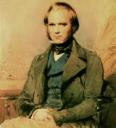I will be teaching a workshop on writing the endings of short stories and novels at the Mad Anthony Writers’ Workshop April 13-15 in Hamilton, Ohio. In the process of preparing, I was made conscious of subjects that generally remain unconscious as I’m first-drafting a novel; specifically, my point-of-view character’s inner conflict. The inner conflict is that struggle by which a character prevents himself from getting what he desperately wants. Sound counter-intuitive? It is. And yet we all sabotage ourselves for perfectly good reasons. So do our characters.
Charles Darwin, the subject of my currently circulating novel, SANDWALK, provides a case in point. Here was a man who desperately wanted to be a gentleman, as defined by 19th century Britain. He was afraid to upset the status quo, and yet, his life work was to develop a theory that would challenge the very existence of God. How did he deal with this? He dawdled. He spent twenty years on his research, writing directions to his wife to publish the material after his death. What compelled him? The death of his daughter, whose suffering led him to deny the possibility of a loving God. It happened, when he received an essay from Alfred Russel Wallace describing a theory too like his, that he was faced with the necessity to publish immediately, or lose credit for his twenty years of work. Ambition, specifically the need to prove himself to a father who predicted Darwin would never amount to anything, drove him to establish himself as co-author of a theory that would make him the target of 150 years of debate. Some argue that this internal conflict was the cause of the sickness that made him an invalid for the productive years of his life.
And what of Albert Einstein? A story was aired on “All Things Considered” last evening announcing the web publication of Einstein’s letters. The letter read aloud on the air was one he wrote to his mother, Pauline, when she was terminally ill with stomach cancer in which Albert describes his sadness at the extremity of her suffering. The fragment of the letter, considered by itself, would suggest Albert was a dutiful son who dearly loved his mother. Not so! In fact, she was the source of his greatest inner conflict, her demand that he conform to the bourgeois standards of middle class German Jewry in conflict with his desire to live a Bohemian lifestyle and marry Mileva Maric, the Serbian Orthodox Christian his mother despised. The drama of his life played out in opposition to his mother, while, at the same time, he was unable ultimately to disobey her, finally leaving Mileva and marrying his cousin, Elsa, as was the common practice among the Jews of Germany.
How are inner conflicts resolved in fiction? There are two choices: The character realizes he is sabotaging himself and changes, or he fails to realize it. The meaning of the ending is affected by this choice.
The techniques for delivering the choice will be covered in my workshop.


